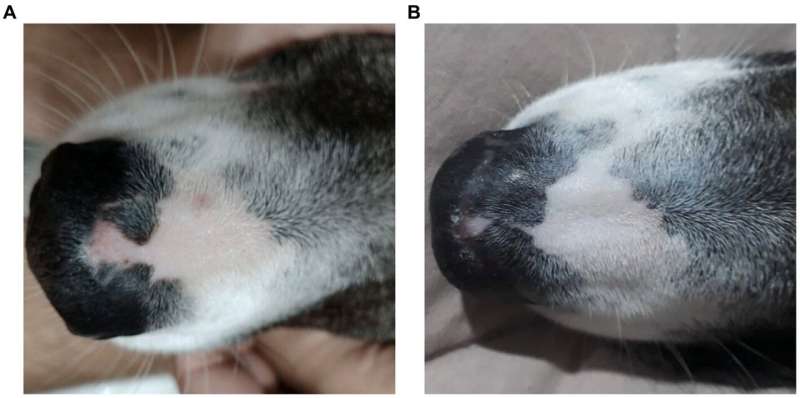February 28, 2024 report
This article has been reviewed according to Science X's editorial process and policies. Editors have highlighted the following attributes while ensuring the content's credibility:
fact-checked
trusted source
proofread
Cannabis oil found to be effective treatment for canine discoid lupus erythematosus

A team of veterinary students and scientists at the Federal University of Santa Catarina, in Brazil, working with the Cannabis Development and Innovation Center, also in Brazil, has found that oral administration of cannabis oil to dogs can reduce symptoms of discoid lupus erythematosus (DLE), a canine autoimmune-based skin disorder.
In their study, published in the journal Frontiers in Veterinary Science, the group tested the effectiveness of cannabis oil with a dog suffering from DLE after traditional treatments made no improvements.
DLE is a disorder that affects the skin on the nose and ears of dogs. It is characterized by inflammation, loss of hair and pigment, redness and sometimes crusting ulcers. Currently, it is treated by giving the dogs corticosteroids, drugs that calm inflammation—the same types of drugs given to humans with similar types of skin problems.
In this new study, a two-year-old mixed breed dog suffering from DLE was not responding to the standard treatment, so the research team tried a new approach—giving the dog cannabis oil.
Prior research has shown that different types of cannabis oil can reduce inflammation in both dogs and humans. Prior research has also failed to find any detrimental side effects. Thus, it was deemed safe to treat the dog in this case with a mix of the oils.
Cannabis oils typically come in two different types: those based on cannabidiol (CBD) and those based on tetrahydrocannabinol (THC)—both have anti-inflammatory effects. The latter is the one responsible for the "high" associated with consuming or smoking cannabis.
Because cannabis oil had not been used before to treat DLE, the researchers tried a variety of oils with different levels of CBDs, THCs or both. They eventually found that a mixture of 3 to 1 CBD to THC worked best.
Initially, the dog was given a single drop orally once a day for three days to test for any negative reactions. Upon finding none, they gave it a drop a day for several weeks and found signs of DLE disappearing. After a year, all symptoms were gone. To prevent new outbreaks, the dog was thereafter given smaller doses on a recurring basis. The researchers report no further recurrences.
More information: Maria Eduarda Schmitz da Silva et al, Case report: Cannabinoid therapy for discoid lupus erythematosus in a dog, Frontiers in Veterinary Science (2024). DOI: 10.3389/fvets.2024.1309167
© 2024 Science X Network




















